- Administrator
- Albums and Singles
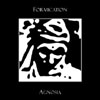 Formication are the Nottingham based duo of Alec Bowman and Kingsley Ravenscroft who have recorded for Lumberton Trading Company (Thighpaulsandra, Experimental Audio Research). My previous experience of their music tells me the ideal way to submerge myself in their latest mini-album is through headphones, by candle light with an ice cold Guinness in hand.
Formication are the Nottingham based duo of Alec Bowman and Kingsley Ravenscroft who have recorded for Lumberton Trading Company (Thighpaulsandra, Experimental Audio Research). My previous experience of their music tells me the ideal way to submerge myself in their latest mini-album is through headphones, by candle light with an ice cold Guinness in hand.
The album's intro begins with some sinister electronic percussion while dark atmospheric synths create an unsettling feeling. Distant voices that sound like they're speaking in tongues suggest a nightmarish paranoia. The second track has a wailing sound that resonates through the off kilter percussion while layers of crackles permeate the sound of broken machines, like the technology is dying, taking its final breath as it malfunctions. The third track has a warm, lush beauty: minimal melodic keys and chimes sound familiar and comforting, like coming out of a bad trip with a sense of hope. It is simple in its execution yet astounding in its beauty. It is indeed "deep listening" as lots of subtle intricate pulses in the background can be tuned in to, and it is no longer the nightmare suggested by the album's opener.
As the comfort of reality sets in following the end of the nightmare, a restful sleep follows, but the relief is temporary. The sound of artificial crackles and fizzes are disorientating upon re-entry into that dark place, the most distant recesses of the subconscious. Meanwhile, the insect wings fluttering at hundreds of miles an hour puncture the brooding sub bass that weaves in and out of bubbling liquids, deeply rich textures, bleak soundscapes and synthetic audio sculptures. All the while a sense of melancholy permeates. It's a new world but it seems familiar. A million shades of black can be seen and each one is more intriguing than the last.
Agnosia closes with a cinematic, haunting piece that evolves into a hybrid techno track with eerie vocals and a futuristic vibe full of lurking tension and passionate intensity. It eventually becomes totally claustraphobic but as soon as it all becomes too much and I need to turn the lights on I'm relieved with white light as the album fades away like the ghost of a distant memory.
Agnosia is a set of tracks that are interesting on every level from their glacial surface through to each subtle detail in the production. At a running time of just over 32 minutes it doesn't overstay its welcome and therefore is ideal for some late night solo escapism during the impending winter.
Although the music is electronic in its construction it retains an organic, human feel throughout. Here are a duo who have truly mastered the art of black electronics: imagine Darth Vader and Aleister Crowley on powerbooks after completing a PhD in sound design. It is genuinely original sounding material that fans of Coil, Rapoon, Deathprod, and recent Dopplereffekt should investigate.
streaming sounds available at http://www.theformicarium.com/
Read More
- Administrator
- Albums and Singles
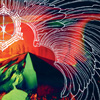 Sightings sound like they come from another galaxy: their trashed metallic gutter rock has been giving earthlings tinnitus for a few years now. I expect it's how Chrome would sound to my Grandma. Their latest on Providence's Load is a little different. Something's changed.
Sightings sound like they come from another galaxy: their trashed metallic gutter rock has been giving earthlings tinnitus for a few years now. I expect it's how Chrome would sound to my Grandma. Their latest on Providence's Load is a little different. Something's changed.
What I love about Sightings is the completely overloaded, everything in the red, amps melting, full on bombastic racket that they create. However for this album they have utilized the production skills of Andrew W.K. (lately working with Lee "Scratch" Perry and Current 93) to create a far tamer, refined almost commercial sound. Although they've definatley been polished, there's still enough dirt to make this a great record. The band have gone on record as saying that they do not consider themselves strictly a noise act but a rock band. This is apparent as soon as the album kicks off with "A Rest."
My initial response to the new sound was one of bewildermeant and a hint of disappointment: the vocals are brought to the fore with the lyrics far easier to decipher, with them not being lost in a huge ball of chaotic noise. Then the realization of just how talented a songwriter Mark Morgan actually is set in. The ears eventually re-adjust to the new aesthetic and the album becomes as enjoyable as any of their previous works. Instrumental piece "Cloven Hoof" begins with a brooding distorted bassline before the cochlea are pummeled into submission by some ultra fast tribal beats and sci-fi horror electronics. The intensity increases throughout and it's pretty forward thinking for a "rock" band.
"This Most Real Of Hells" has a shuffling typewriter amplified into space sound at its core with a colossal wall of pure shattering distortion. The vocal is a spoken word type affair where Morgan sounds like a man posessed. "Certificate of No Effect" has the trio in fine form, screeching along to a pounding heavy groove which becomes obscene. Then the title track is like trademark Sightings: disorientating, wobbly bass, primal drums and a schizoid multi layered vocal. It is a tremendous piece of total cacophany which sits perfectly before "Degraded Hours," which is probably as close as these guys are ever gonna get to a ballad. A dark delay drenched bassline sits as the tracks foundation while pretty piano nestles beneath a melancholy vocal. It is a genuinely haunting song. The second instrumental cut, "Black Peter," ends proceedings in style with its chugging mechanical feel, infectious stomp, intricate oscillations, melodic guitar (Well almost!) and a bassline that's like ESG on Ketamine.
Through the Panama has all the qualities of a great album: shards of ear splitting feedback; alien rhythms; off kilter shambolic funk; smatterings of electronics that compliment the sound perfectly, fantastic use of stereo; unhinged aggression; quieter introspective moments; and a super cool cover of Scott walker's "The Electrician." The artwork is a suitably dark bird feather and chicken wire combination.
Upon subsequent listens I have a huge grin on my usually somber face. The genius lies in how the songs seem utterly chaotic and yet structured. Through The Panamais as essential as Absolutes, Arrived In Gold, End Times, or Michigan Haters. A vinyl edition is soon to follow on the Ecstatic Peace label.
MP3 download: Perforated
Read More
- Administrator
- Albums and Singles
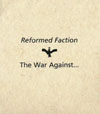 As members of Zoviet France, Mark Spybey and Robin Storey helped expand ambient music from new-age window dressing to something more dark and compelling. Starting almost 29 years ago, they were among the first artists to fuse the caustic sounds and spartan imagery of Industrial Music with dreamy atmospherics and indigenous insturmentation. This album, their second as Reformed Faction, encompasses the varied sounds and techniques in its members' formidable back catalogue.
As members of Zoviet France, Mark Spybey and Robin Storey helped expand ambient music from new-age window dressing to something more dark and compelling. Starting almost 29 years ago, they were among the first artists to fuse the caustic sounds and spartan imagery of Industrial Music with dreamy atmospherics and indigenous insturmentation. This album, their second as Reformed Faction, encompasses the varied sounds and techniques in its members' formidable back catalogue.
Spybey and Storey are masters of low-key menace. Many of the striking tracks on The War Against… exude a distant and concealed hostility that's echoed by the album's deliberately incomplete title. On "Silver Fuse," back-masked voices babble and stutter like corrupted surveillance tapes, echoing the Cold War aesthetics of Zoviet France. Throughout the album, Spybey and Storey demonstrate their talents as vocal manipulators. "The hostile powers have left us" uses soft tremolo to break up medieval plainchant into a pearly fog. Moans and heavy gasps hover above wisps of static and roiling percussion in "The rotted stick that screeches lying."
The mood of this album isn't uniformly dour. The title track is a gentle beatscape flavored with vocoder and choral synths. Short loops of Chinese and Indian folk music lighten the atmosphere between the darker, more expansive pieces. Yet many of the transitions are awkward and not immediately logical. Listening to the album feels like having five records playing in a random mix. Almost every track could be considered ambient music, but abrupt changes in mood disrupt passive listening. A plaintive violin loop suddenly skips and dissolves, the deep resonance of a pounding drum taking its place. Chimes and bells break into concussive slaps and hiccupping voices.
The schizophrenic structuring of The War Against… took a while to get used to. Not only did I have to overcome my initial confusion, but also my desire for a concrete narrative to attach to the music. I needed to actually listen instead of searching for some poorly hidden theme or asking some presupposed question about the artists' intent. My expectations only detracted from the experience of appreciating it intuitively.
samples:
Read More
- Administrator
- Albums and Singles
 Sharp-edged yet danceable, Pylon's 1980 debut was among the first to bring attention to the diverse musical hotbed of Athens, Georgia, and yet somehow it slipped through the cracks when the world went digital. Thankfully this egregious oversight has been corrected and released back upon the unwary world sounding better than ever.
Sharp-edged yet danceable, Pylon's 1980 debut was among the first to bring attention to the diverse musical hotbed of Athens, Georgia, and yet somehow it slipped through the cracks when the world went digital. Thankfully this egregious oversight has been corrected and released back upon the unwary world sounding better than ever.
Guitarist Randall Bewley and bassist Michael Lachowski already had a clear vision for their band before auditioning Vanessa Hay on Valentine's Day 1979, and yet her presence managed to fuel them to even greater heights. Becoming the group's voice, Hay's impassioned breathless growling panting reactionary yelping howl is one of the best things about the group. She keeps them viciously alive even 30 years later.
Yet each musician contributes a unique element to the group's sound. Curtis Crowe's drumming is fantastic and keeps the band's fire constantly churning. More than a mere timekeeper, his power of expression elevates the instrument far above the ordinary. Lachowski and Bewley serve much the same rhythmic and melodic purposes as each other yet they keep their individuality intact. That they share the space within the compositions rather than fight for it enhances the band's chemistry.
This painstakingly restored recording starts off with the addition of the band's first 7", "Cool/Dub." It's an auspicious beginning with all of the essential elements already in place, but the album's true opener is "Volume." Laid-back yet confrontational, here the band kicks things up a notch. The pace is relentless until "Weather Radio," a light instrumental that serves as a quirky intermission. They return to a steady attack, and though they may strain against themselves a couple of times before the album's finished, they always manage to revive with greater ferocity than before. "Read a Book" and "Working Is No Problem" are standouts amongst several highlights. Perhaps the most fiery song is the original closer "Stop It," Hay's ranting lyrics concluding the album with heated anticipation as to what the band would accomplish next.
The bonus tracks included here at the end are somewhat forgettable since the album ended perfectly the first time around. Even the previously unreleased demo "Functionality" describes the group's aesthetic but is of more historical interest than listening pleasure. Regardless, the single and original album alone are enough of an attractive package to make any extras unnecessary.
Independent of its context, this recording is as exciting as ever. With a perfect balance of feeling and intelligence, they communicate a unique vision of singular purpose. Whatever glory the band lost when this album fell out of print should now be fully restored. This isn't a history lesson, it's an ass-kicking.
samples:
Read More
- Administrator
- Albums and Singles
 Between playing in Wolf Parade, Frog Eyes, and Swan Lake, Spencer Krug has managed to come up with another full-length from the band he originally started as a bedroom project, Sunset Rubdown. Somehow it manages to be both catchy and immediate even though its songs are longer and more complex than the usual pop fare.
Between playing in Wolf Parade, Frog Eyes, and Swan Lake, Spencer Krug has managed to come up with another full-length from the band he originally started as a bedroom project, Sunset Rubdown. Somehow it manages to be both catchy and immediate even though its songs are longer and more complex than the usual pop fare.
Listening to this album can be exhausting without a willing attention span because most of the songs last around five minutes and go through several disparate sections. There is a lot to digest, and it takes a few spins before the task gets any easier. The music goes through several moods, sometimes within one song, and even the memorable parts can be fleeting. Yet it does begin to unravel after a while, with each familiar section becoming an oasis from which to venture further on each successive pass.
I can't say that any one song sticks out more than the others except for maybe the opener "The Mending of the Gown," whose brisk pace forces the listener to take sides: either jump on board or get out of the way. It's an effective tactic that lured me deeper into the album, and I'm thankful for it. Parts of tracks such as "Up On Your Leopard, Upon the End of Your Feral Days," "The Courtesan Has Sung," and "Trumpet, Trumpet, Toot, Toot!" are instantly recognizable even if I'm not always sure how they fit into the larger whole. The production adds a discernable quality to everything as well. The variety of instruments, precise layering, and unpredictable arrangements make this an intriguing experience even beyond the songwriting.
I have to admit that the affectation in Krug's voice has always turned me off a little bit, but after a few listens I was able to put that aside long enough to realize that these songs are actually pretty well-crafted and intricate. His lyrics tell puzzling little stories that are worth hearing for their clever moments of poetic juxtaposition. Sometimes his mannered style of singing can cloud the direction of the music or even constrict its impact, but it's worth it if only for the exposure to these dense layers of pop nuggets.
At times befuddling and wearying, Random Spirit Lover is just as often thrilling and breathtaking. It runs through a plethora of emotions at a bewildering pace, yet it is so tightly woven that it never feels like a mess even when it seems about to fall to pieces. I have to admit that this album has some pretty many impressive qualities even if I feel worn out and hung over after listening to it.
samples:
Read More
- Administrator
- Albums and Singles
 Texture is as important as ever to Yellow Swans on their new album, but this time their typical noisy elements are put to a different task. Still using gritty walls of distortion generated through guitar, voice, and electronics, Yellow Swans also add a melodic touch to these shape-shifting songs. The result is an unexpectedly gorgeous album unlike anything I've heard from them before.
Texture is as important as ever to Yellow Swans on their new album, but this time their typical noisy elements are put to a different task. Still using gritty walls of distortion generated through guitar, voice, and electronics, Yellow Swans also add a melodic touch to these shape-shifting songs. The result is an unexpectedly gorgeous album unlike anything I've heard from them before.
The title track begins things as a miasmic cloud that seems to get louder and louder as it drifts, infecting soft pink tissue everywhere it spreads. Yet the song takes a heroic turn toward melody in the final three minutes, altering the landscape altogether. They channel interstellar communication with "Stretch the Sands," alien and intriguing yet not relying on pervading doom to introduce a new exoticism. Then they blast things wide open with "Our Oases," a touching supernova of washed out guitars and collapsing vocals. It runs obliviously into the sun before being swallowed by a bleating bass blurp.
The group makes use of symphonic distortion on the grainy yet uplifting "Mass Mirage." It's a surprisingly effective piece, a mood I wouldn't have expected from this group previously and a welcome surprise. Contemplative guitars hover against a background of subtly changing alarms on "Endlessly Making an End of Things" before sudden blasts of bass send the unwary listener scrambling for cover in a white noise nuclear panic. Dual guitars solos race the album into the ground.
Discrete and distinct, each of the songs here shows a developed maturity. The recording has all of the grit I have come to expect from them, but they also venture into emotional realms I never figured they would explore. With their shift toward melody, Yellow Swans' compositional skills have come to the fore. An elevating and hypnotic album of uncommon beauty, it's the sort of thing I never expected to hear from this noisy duo but am thankful I did.
samples:
Read More
- Administrator
- Albums and Singles
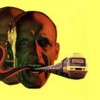 One of two Pollard solo albums released on the same day, this one contains jagged rock fragments, choppy rhythms, and snippets of alien transmissions. It's the more immediate and visceral of the two, with a huge sound and great performances, and it's easily one of the best rock albums I've heard from Pollard-or anyone, for that matter-in a long time.
One of two Pollard solo albums released on the same day, this one contains jagged rock fragments, choppy rhythms, and snippets of alien transmissions. It's the more immediate and visceral of the two, with a huge sound and great performances, and it's easily one of the best rock albums I've heard from Pollard-or anyone, for that matter-in a long time.
Pollard has used a string of soft openings on recent albums, but "Killers" starts this one like a gunshot, continuing a strong run through the tug and pull of "Pill Gone Girl," the studied but bombastic "Hero Blows the Revolution," and culminating in "Psycho-Inertia," whose array of guitars and vocal performance would bring him a big hit in a better world. Nothing slows until "Lay Me Down," a lackadaisical song like many I've heard from him before but with a punchy ending. An unusually gravelly Pollard begins "Butcher Man," before rocketing away in another direction. Almost a continuation of that song in mood and instrumentation is "Motion Sickness Ghost." Screams and a great guitar solo raise the ending to a white-knuckled crescendo. The album changes direction yet again with the laid-back and bouncy, "I in the World." Additional organ and strange background vocal effects keep this pleasantly uneasy. Even the brief "Here Comes Garcia" has a sudden intrusion from an unknown source to keep it unpredictable.
Following these tracks, the slow pace of "Island Lobby" is a little out of context, especially followed by the equally patient "Folded Claws," but the overall atmosphere during this stretch doesn't deviate from the rest of the album. The rock returns in full force with "Feel Not Crushed." Its chord progression reminded me of other Pollard songs, but considering he's written well over 1,000 of them, that can happen from time to time. The double bill of "Accusations" and "Don't Trust Anybody" fuels the album with dazzling paranoia, the latter with layers of Pollard's vocals under a variety of recording conditions imploring the listener to obey the song's title. Apart from the puzzling intro in which an organ channels Cream's "Spoonful," energetic closer "Spider Eyes" is as powerfully driving of a song as any Pollard's done, his vocals strong as ever in both volume and effect.
Pollard's principle collaborator post-GBV, Todd Tobias, feeds these songs to a huge space, giving them the big sound they deserve. The effects and treated materials are also particularly well-balanced on this album, making his mild experiments a welcome addition rather than a distraction. It might be his most lively production to date and merits more recognition than a mere producer credit may imply.
I've been wary of much of Pollard's post-GBV solo material apart from From a Compound Eye, but I'm not sure if anything can get better than Standard Gargoyle Decisions. Some of the best parts here rival Pollard's most accomplished work, and even the ones that aren't quite at that level don't slow things down much. This is the Pollard album for which I've been waiting far too long.
samples:
Read More
- Administrator
- Albums and Singles
 One of two Pollard solo albums released on the same day, this one contains slower tempos, expansive vocals, and an overall lighter touch. Lush and less experimental than its companion, it highlights Pollard's growing maturity as a pop songwriter and soft rock connoisseur.
One of two Pollard solo albums released on the same day, this one contains slower tempos, expansive vocals, and an overall lighter touch. Lush and less experimental than its companion, it highlights Pollard's growing maturity as a pop songwriter and soft rock connoisseur.
Pollard hasn't reinvented himself with this album, but he has certainly smoothed out a lot of the rough edges that have cropped up on his last couple of solo releases. His singing especially reflects more effort than I heard from him on Normal Happiness or Silverfish Trivia. The only things that trip up this album for me are that some of the hooks are slow to take hold and a few songs have chord progressions not too different from some in Pollard's history, as if in some places Tobias is using Pollard's past as a map to guide the future rather than forging ahead in another direction. Considering Pollard's extensive back catalog, that's not necessarily a bad thing.
Nor should that imply that this album lacks strong or unique material. The rock ending of "Count Us In" was the first thing to really grab my attention, bringing much-needed emotional vitality to the song. "Current Desperation (Angels Speak of Nothing)" is a pop song as satisfying as any he's written. He already has plenty of delicate ballads under his belt, to which should now be added "Dumb Lady" and "When We Were Slaves." "Rud Fins" is one of the album's most upbeat songs and perhaps its strongest, evoking some of the same traits that made the golden era of Guided by Voices so memorable. One of my other favorites is the oddly hypnotic "Penumbra," although "I Clap for Strangers" and "Youth Leagues" also standout from the rest on the album's second half.
While this is a consistently solid record, I feel like some of these songs would have come alive more vividly through the give-and-take that comes from working with a full band rather than one sole collaborator, no matter how talented Todd Tobias may be. Still, the production here is top-notch for this material because the simple instrumentation sounds full rather than minimal, framing the subtle arrangements and Pollard's voice within the best possible context.
Between this album and its companion, I don't see what else Pollard can do to improve upon his work other than introducing other people into the mix. Coast to Coast Carpet of Love may not be as quick to thrill as Standard Gargoyle Decisions, but it still has plenty of charm to stand on its own. It was somewhat of a grower for me, but a fine release nonetheless and a welcome return to form.
samples:
Read More
- Administrator
- Albums and Singles
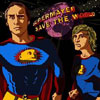 A collaborative project between these two underground heroes of electronic dance music had the potential to take the best elements of both producers' skill sets and make one of the most powerful, essential albums of 2007. Instead of saving the world as the goofy title boasts, the abortive album represents exactly what happens when egocentric hype overtakes substance.
A collaborative project between these two underground heroes of electronic dance music had the potential to take the best elements of both producers' skill sets and make one of the most powerful, essential albums of 2007. Instead of saving the world as the goofy title boasts, the abortive album represents exactly what happens when egocentric hype overtakes substance.
Both Michael Mayer and Aksel Schaufler know how to write good—even great—albums. Touch, Mayer's 2004 full-length, offered some lush productions that hinted at Kompakt's consecutive shift to maximal techno and neo-trance. Schaufler's Superpitcher project achieved international critical acclaim and superstar DJ status with his definitive schaffel-house album Here Comes Love earlier that year. With such astronomical expectations surrounding this new release, their first album as the unimaginatively dubbed SuperMayer, perhaps I should have anticipated the disastrous results.
From the very start, SuperMayer Save the World instills such dread that it suggests the aural catastrophe that follows. Glib introduction "Hey!" leads into "The Art of Letting Go," a DFA-esque bit of insipid dance rock with cut-and-paste funk so apparently formulaic and sequenced that it immediately presents the guys as either well-meaning imposters or lousy comedians. Failures such as "The Lonesome King" and the unbearably kitschy "Cocktails For Two" endeavor to maneuver the downtempo quandary, the former being particularly unlistenable. Even the proper dance tracks consistently miss the mark when held against the potent discographies of Mayer and Schaufler. The pointless "Planet of the Sick" utilizes repetitive old school rave stabs and effected, layered vocals that manifestly lack the melancholic cool of Superpitcher's "People" or "Even Angels." Mired in vapidity, "Two Of Us," released as an advance single, necessitates such an immense amount of patience to sit through that it seems implausible that one would care to actually dance to it.
Quite possibly the worst album I've heard all year, SuperMayer Save the World requires more than just an open mind; it entails a superhuman ability to withstand vainglorious artistic excess. It should be noted that Mayer runs the Kompakt label, which seems to be the only logical reason why this godforsaken self-indulgent dreck was actually released instead of incinerated. I have a hard time accepting that should this have come to his attention in the mail that it would have been given even a fraction of his time. If Mayer and Schaufler ever expect to return to past glories in the face of such masturbatory shark-jumping, this had best mark the end of their days as a costumed crime-fighting / production duo.
samples:
Read More
- Administrator
- Albums and Singles
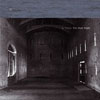 Those recordings that can successfully create visual atmosphere as well as an audio one are rare, but here is one that conveys, through field recordings, vintage electronics, and digital processing, a sense of cold and isolation, yet familiarity at the same time.
Those recordings that can successfully create visual atmosphere as well as an audio one are rare, but here is one that conveys, through field recordings, vintage electronics, and digital processing, a sense of cold and isolation, yet familiarity at the same time.
Though Nilsen utilizes field recordings from a variety of "cold" places (Sweden, Iceland, and the UK), it is never a crutch to fill in gaps in the sound. Instead, it is another pale shade in his sonic pallet, alongside vintage microphones, early analog synths, and modern DSP tools, that constructs a thick painting of frigid landscapes that still manage to ooze a natural warmth. The expansive field recordings that open the disc seamlessly segue into a processed, edited form that coalesce with the high pitched tones, all icy and glacier. Soft tones and melodies mix with a heavy, thick organ sound like the foghorn of a ship far off in the distance.
Other tracks revel in bizarre synthetic textures, the vinyl surface noise like crackles of "Icing Station" and the strange organic rattles of "Finisterre" are both some unknown combination of classic technology with modern processing, and the field recordings are among the few that actually give some sense of life in the barren cold: birds chirping and singing songs within the noisier elements.
Elements of noise, not in the harsh, punishing sense, float to the surface in "Black Light" and "Viking North." The noise sounds not as if it is coming from a distortion pedal, but more the product of the old tape equipment used being pushed beyond its limits. It is a very unique analog form of clipping that sets the noiser elements apart from the more lazy practitioners. Its appearance in "Black Light" is especially effective, as it is the apocalyptic climax to a sprawling piece of bleak, dark ambience with some subtle percussive elements buried deep the misty mix.
The Short Night, despite its singular title, is more of a collection of times and places frozen in space. Each of the tracks are entities unto themselves, and placed together form an excursion into the dark, frigid, and desolate, yet still maintaining a core of warmth and humanity. Unsurprisingly, BJ Nilsen and Touch have produced yet another winner.
samples:
Read More
- Administrator
- Albums and Singles
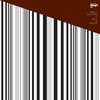 Leave it to Editions Mego to release something that is so unclearly either random electronic improvisations or a highly structured piece of experimentation. But whatever it is, Altars of Science is a captivating piece of computer wizardry that is surely even more fascinating in the included 5.1 surround sound mix.
Leave it to Editions Mego to release something that is so unclearly either random electronic improvisations or a highly structured piece of experimentation. But whatever it is, Altars of Science is a captivating piece of computer wizardry that is surely even more fascinating in the included 5.1 surround sound mix.
I must specify before the review that, although this release is packaged as a dual disc, containing the stereo mix of the piece on one side, and a 5.1 DVD compatible surround sound mix on the other, that my copy was only of the stereo mix, so I cannot completely speak for how the surround portion is. However, given the layering and disorienting phasing and panning of channels in the stereo version, I can only imagine the surround mix is even more fascinating if you have the equipment to fully enjoy it.
Altars of Science is a single piece of computer generated chaos, split across eight individual tracks, indexed for ease of listening. The track dives in with the electronic noise, buzzing, distortion, sharp piercing tones, air raid sirens, all things that make for uneasy listening. There is no gentle introduction to science, just a quick dive into the mechanization. The piece begins to calm, if only somewhat, by focusing more in swells and pulses of noise, akin to cars racing by on a freeway, rendered via an old Atari video game. Glitch type outbursts are unexpected and a bit shocking at times, punctuating the mix with even more volume and force. Then, like an unprepared spacecraft re-entering orbit, the sounds begin to come apart, like pieces flying off and burning in the atmosphere, represented through stutters and digital time stretching.
Later, the panning and shifting of the computer-based noise is like a swarm of insects, their tiny wings amplified to defining volumes, coming together to destroy an old mainframe computer a la the kind in Wargames, all flashy lights and meaningless bleeps. The buzzes mix with the dying beeps of the machinery, a bit of nature triumphing over science. The culmination of the disc is a final bit of minimalism, buried clicks and scratches, some stuttering, much more mellow and less aggressive than the previous parts of the work, the calm reflection after the previous storm.
Schmickler's Altars of Science has enough harshness and chaos to appeal to fans of harsh realms despite being a work of electronic composition. Although he has previously worked in more conventional and pop-like genres, this is purely experimental. It is hard to say whether this is one man improvising with his laptop, or something that was planned, programmed and scored beforehand. In the end, it really doesn't matter worth a damn, because the final result is exemplary.
samples:
Read More

